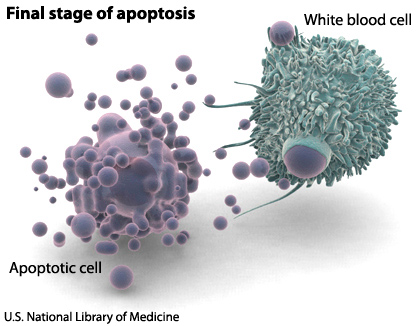It has been known for many years that alcohol can kill both mature neurons as well as the stem cells that give rise to new neurons. Only recently have scientists been able to demonstrate how neurons die by actually visualizing the effects of cell death in a human brain. Let’s take a closer look at what happens.
First not all cell death is the same. Alcohol is toxic in high doses and can kill cells quickly. It is metabolized by alcohol dehydrogenase (ADH) to form acetaldehyde a very reactive molecule that can cause damage to many types of cells.
Review how alcohol is metabolized by ADH
The metabolism of alcohol also generates reactive forms of oxygen (oxygen radicals) that are toxic to cells by damaging proteins DNA and lipids. Thus in high doses alcohol can cause an acute cell death or necrosis. Necrosis occurs when a cell is damaged traumatically (for example when the cell membrane is destroyed). The necrotic cell swells up and ruptures spilling its contents into the extracellular space. This creates an inflammatory mess resulting in the death of neighboring cells. Necrosis can be thought of as a “quick and dirty” form of cell death.
On the other hand alcohol can cause a more tidy kind of cell death called apoptosis. This form of cell death is actually genetically programmed by the cell itself—the cell dies by suicide. Cells not only contain instructions to grow and divide but also to ultimately die in the event that they are injured or just a bit too old! When alcohol injures cellular organelles (for example by generating oxygen radicals), this triggers DNA transcription and translation to produce a series enzymes that direct the cell death process; the cellular cytoskeleton is dismantled the chromatin condenses in the nucleus the cells shrink and small “blebs” of cell membrane containing cytoplasm bud off. The dying cell and blebs are consumed by macrophages a type of white blood cell that moves in to remove the debris. Unlike necrosis, cell death by apoptosis usually doesn’t affect neighboring healthy cells.
 Figure 3.6 Cells can die in a tidy manner by apoptosis; macrophages (white blood cells) clean up the mess. Taken from: http://ghr.nlm.nih.gov/handbook/illustrations/apoptosismacrophage
Figure 3.6 Cells can die in a tidy manner by apoptosis; macrophages (white blood cells) clean up the mess. Taken from: http://ghr.nlm.nih.gov/handbook/illustrations/apoptosismacrophage
Learn more about apoptosis.